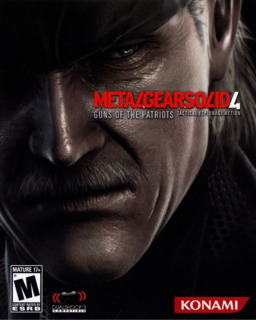Metal Gear Solid 4 is the epitome -good and bad- of the entire series. It is also the triumph of Hideo Kojima's vision.
As the Metal Gear series ostensibly ends with this instalment of Kojima's epic and often convoluted conspiracy series, there is a lot of explaining and tying up of loose ends to do before the final credits roll. Kojima's avowed love of cinema has never been more evident than in MGS4: ultra-lengthy cut-scenes often mean the player can put the controller down for a good twenty minutes at a time. The cut-scenes themselves are the best ever made for a game: character modelling and the hi-def rendering are amazingly detailed, with only some of the myriad plot twists letting the side down in spots. The sheer amount and duration of these in no ways lessens their quality as the game progresses.
Of course, critics of the games in the past will repeat what they have said in the past: games are to be played, not watched. The occasional quick-time button pressing during these scenes (in order to trigger comic-book flashbacks) and the ability to move around during the briefing scenes only emphasises the passivity that comes from these scenes, which take up roughly sixty percent of the entire game experience. As one of these critics in the past, I would answer that the cut-scenes are of such quality and add so much to the Metal Gear universe that they largely mitigate the relative lack of gameplay in the MGS4 experience.
Gameplay itself is very similar to previous iterations of Metal Gear Solid. The responsiveness of the player character (an aged version of famous Snake Plissken) is generally good, but my gripes about his slowness to turn, stand after executing rolls, and lie down flat still stand. The game engine -including enemy A.I.- is essentially the same as Snake and Raiden's debut on the PlayStation 2 in 2001. The engine is ageing, like Snake himself, and this sometimes lets down the otherwise diamond polish of the graphical and sonic production.
However, the central issue with gameplay is that there is simply not enough of it. The first two acts, with their innovative Faction system, are probably the best in the game, with technically stunning chase sequences involving a bicycle and a Metal Gear mech later on too short-lived to really imprint themselves in the mind after the game is over. Furthermore, an almost-wonderful stealth mission based on a foggy doppelganger of Prague is too on-rails to be truly satisfying. The question remains, as it has since MGS2: does Kojima have enough confidence in the (now ageing) game engine of Metal Gear Solid to expose it more to scrutiny? Or is he just so in love with his self-made myth to switch off his cinema blinkers?
A promising online game comes with MGS4, which will add hours to the overall Metal Gear milieu. But replay value comes with the knowledge that the best the game has to offer comes early on, with sizable dialogue scenes coming to edge out the generally excellent stealth and shooting action. Of course, lovers of Metal Gear Solid won't care, and detractors will find little to really switch them on to Kojima's baby this late on. MGS4's biggest recommendation is it is a Metal Gear game, par excellance; its biggest criticism is it is a Metal Gear game, par excellance. Now go enjoy!

